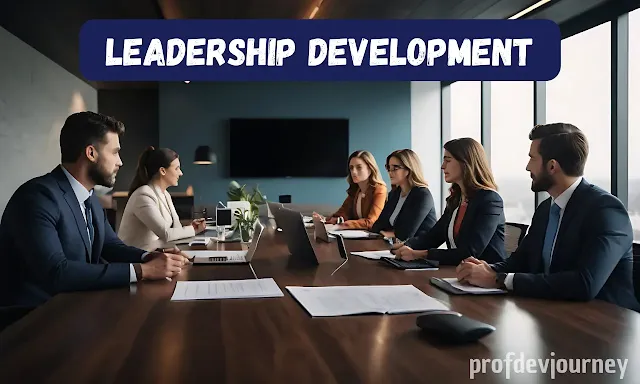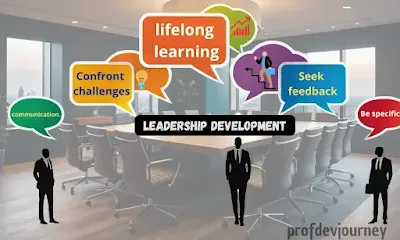 |
| Leadership Development |
In this article, we will explore key leadership development strategies that professionals can apply, regardless of their role or experience level, to enhance their leadership potential. By focusing on continuous learning, emotional intelligence, mentorship, and strategic thinking, professionals can ensure they are ready to take on leadership roles when the opportunity arises.
For professionals at all levels, leadership development starts with self-awareness. Understanding your leadership style and how it impacts others is crucial for growing as an effective leader. Whether you’re just starting your career or have years of experience, continuous reflection on your behavior, decisions, and communication style is essential.
Some key aspects of emotional intelligence include:
In addition to mentorship, building a strong professional network can also accelerate leadership development. Networking provides exposure to different perspectives, leadership styles, and problem-solving approaches. As you progress in your career, having a diverse network allows you to collaborate more effectively and gain insights from leaders across various industries and disciplines.
A key part of leadership development is enhancing both verbal and written communication skills. Here are some ways professionals can improve their communication:
Effective delegation involves:
By focusing on key areas such as emotional intelligence, strategic thinking, mentorship, communication, and growth mindset, professionals can cultivate the leadership qualities that will help them succeed. Remember that leadership development should be treated as an ongoing journey, not a destination. Embrace the process, invest in yourself, and be prepared to take on new challenges as they arise.
This article aims to provide valuable insights into leadership development strategies that professionals can apply, regardless of their career stage. By embedding these strategies into daily practice, you can become a more effective leader and make meaningful contributions to your organization’s success.
1. Understanding Leadership Development: A Continuous Journey
Leadership development is not a one-time event or a rigid formula. It’s a continuous process that requires consistent effort and self-awareness. At its core, leadership development strategies are designed to help individuals understand their strengths and weaknesses, improve their decision-making abilities, and inspire others to achieve common goals.For professionals at all levels, leadership development starts with self-awareness. Understanding your leadership style and how it impacts others is crucial for growing as an effective leader. Whether you’re just starting your career or have years of experience, continuous reflection on your behavior, decisions, and communication style is essential.
2. Fostering Emotional Intelligence
Emotional intelligence (EQ) is one of the most important leadership qualities. It involves the ability to understand, manage, and influence your emotions and the emotions of others. High EQ enables professionals to handle stressful situations, communicate effectively, and build stronger relationships within teams. These qualities are foundational to leadership at any level.Some key aspects of emotional intelligence include:
- Self-awareness: Recognizing your emotions and how they affect your thoughts and behaviors.
- Self-regulation: Effectively controlling your emotions in a balanced manner, particularly when facing difficult circumstances.
- Empathy: Guide your interactions by knowing and understanding the feelings of others.
- Social skills: Building rapport and developing strong, trust-based relationships with others.
3. Mentorship and Networking for Leadership Growth
One of the most impactful leadership development strategies is finding and working with mentors. A mentor is someone who can provide guidance, feedback, and insight based on their own experiences. For early-career professionals, mentors can offer invaluable advice on career growth, leadership challenges, and decision-making.In addition to mentorship, building a strong professional network can also accelerate leadership development. Networking provides exposure to different perspectives, leadership styles, and problem-solving approaches. As you progress in your career, having a diverse network allows you to collaborate more effectively and gain insights from leaders across various industries and disciplines.
4. Cultivating Strategic Thinking and Decision-Making Skills
Strategic thinking is essential for leadership at all levels. Professionals need to know and understand the broader organizational goals and how their role contributes to achieving them. Leadership development strategies that emphasize strategic thinking enable individuals to make choices that support both immediate goals and future ambitions.- To develop strategic thinking: Analyze the bigger picture: Look beyond your immediate tasks and focus on the long-term goals of your team or organization.
- Stay informed: Keep up with industry trends, competitive forces, and market shifts that could impact your work.
- Take calculated risks: Leaders are not afraid to make decisions that push boundaries. Learn to assess risks and make decisions that propel your team forward.
- Learn from failure: Strategic leaders know that failure is part of growth. Use mistakes and failures as opportunities to learn new learnings that enable you to improve your approach
5. Building Effective Communication Skills
Effective communication is fundamental to leadership success. Effective leaders need to communicate ideas clearly, inspire their teams, and resolve conflicts with ease. Communication is also the key to building trust and ensuring transparency in decision-making processes.A key part of leadership development is enhancing both verbal and written communication skills. Here are some ways professionals can improve their communication:
- Active listening: Pay close attention to what others are saying, and engage in conversations with a genuine interest in understanding their perspectives.
- Clarity and conciseness: When delivering messages, ensure that you are clear and concise. Avoid jargon and focus on the key points.
- Non-verbal communication: Body language, tone of voice, and facial expressions play a significant role in communication. Be mindful of how these elements impact your message.
6. Adopting a Growth Mindset
Developing a growth mindset is one of the most effective leadership development strategies. The idea behind a growth mindset is simple: the belief that abilities and intelligence can be developed through hard work, dedication, and learning. Leaders with a growth mindset embrace challenges, seek out opportunities for self-improvement, and view setbacks as learning experiences.
Here are some ways professionals can nurture a growth mindset:
- Confront challenges: Rather than shying away from tough tasks, approach them as valuable learning experiences.
- Seek feedback: Constructive criticism is invaluable for personal and professional growth. Use feedback to improve your leadership skills.
- Commit to lifelong learning: Leadership development is an ongoing process. Continuously seek out learning opportunities, whether through formal education, reading, or professional development courses.
7. Delegation and Empowerment
Delegation is an essential skill for leaders at all levels. Learning how to effectively delegate tasks is crucial for productivity and team development. As you progress in your career, it’s important to recognize that leadership is not about doing everything yourself but about empowering others to take ownership and responsibility.Effective delegation involves:
- Knowing your team’s strengths: Understanding the strengths and weaknesses of your team members allows you to delegate tasks that align with their skills.
- Providing clear instructions: Ensure that expectations are clear and that team members have the resources they need to succeed.
- Trusting your team: Empower others to make decisions and take ownership of their work. This not only enhances their leadership abilities but also frees you up to focus on higher-level strategic priorities.
8. Setting and Achieving Leadership Goals
A critical part of any leadership development strategy is setting clear, measurable goals. Leadership goals help individuals stay focused, track progress, and ensure they are on the path to growth. Whether you're looking to improve your leadership skills or take on a formal leadership role, setting goals can help you stay accountable and measure your success.When setting leadership goals, consider the following:
- Be specific: Define your leadership goals with clear, measurable outcomes. For example, aim to improve your team's engagement score by a certain percentage.
- Make it achievable: Ensure your goals are realistic and attainable within a set timeframe.
- Align with organizational objectives: Your leadership goals should align with your organization’s mission and vision. This ensures that your leadership development is contributing to the success of the organization.
Conclusion
Effective leadership development strategies are essential for professionals at all levels to grow, adapt, and thrive in today’s fast-paced business environment. Whether you are a budding leader or a seasoned executive, investing in your leadership skills will pay long-term dividends for both your career and your organization.By focusing on key areas such as emotional intelligence, strategic thinking, mentorship, communication, and growth mindset, professionals can cultivate the leadership qualities that will help them succeed. Remember that leadership development should be treated as an ongoing journey, not a destination. Embrace the process, invest in yourself, and be prepared to take on new challenges as they arise.
This article aims to provide valuable insights into leadership development strategies that professionals can apply, regardless of their career stage. By embedding these strategies into daily practice, you can become a more effective leader and make meaningful contributions to your organization’s success.
Frequently Asked Questions
Key strategies include setting clear goals, seeking mentorship, participating in leadership training programs, and continuously improving communication and decision-making skills.
Leadership development is important because it enhances the ability to inspire teams, drive organizational success, and adapt to changing business environments effectively.
Professionals can improve leadership skills by seeking feedback, attending workshops, reading leadership books, and practicing active listening and conflict resolution.
Mentorship plays a crucial role in leadership development by providing guidance, sharing experiences, and offering constructive feedback to help professionals grow.
Leadership training programs provide structured learning, enhance strategic thinking, improve team management skills, and help individuals prepare for higher-level roles.


